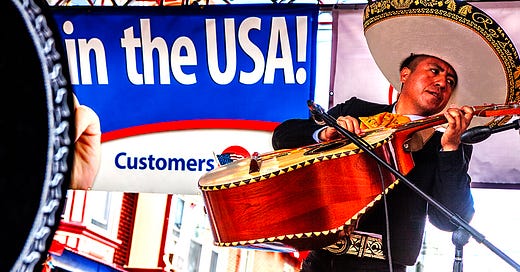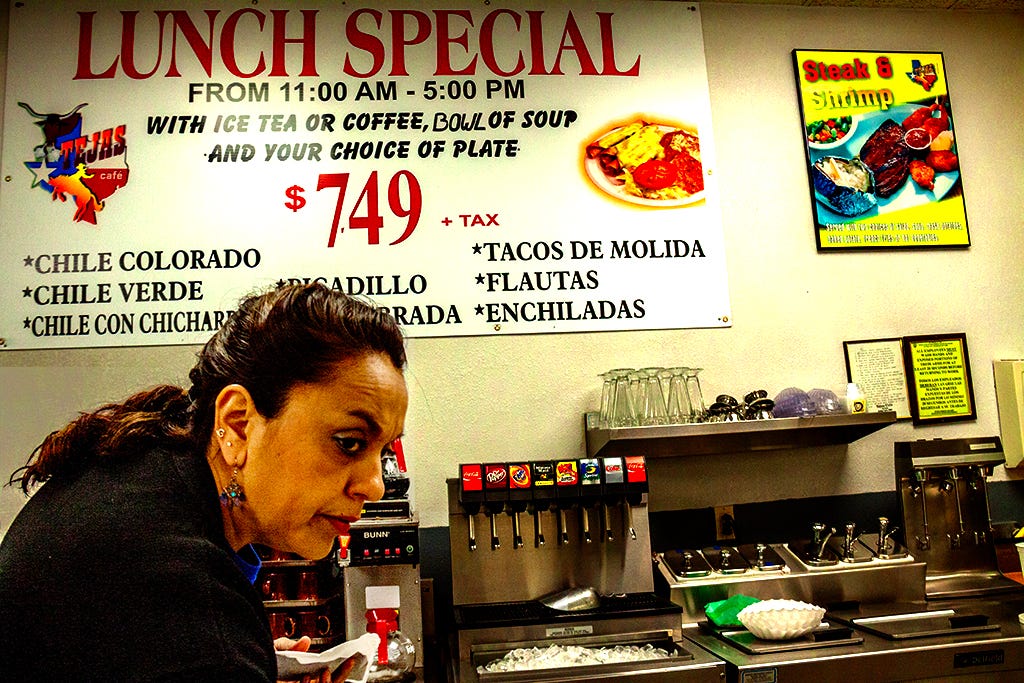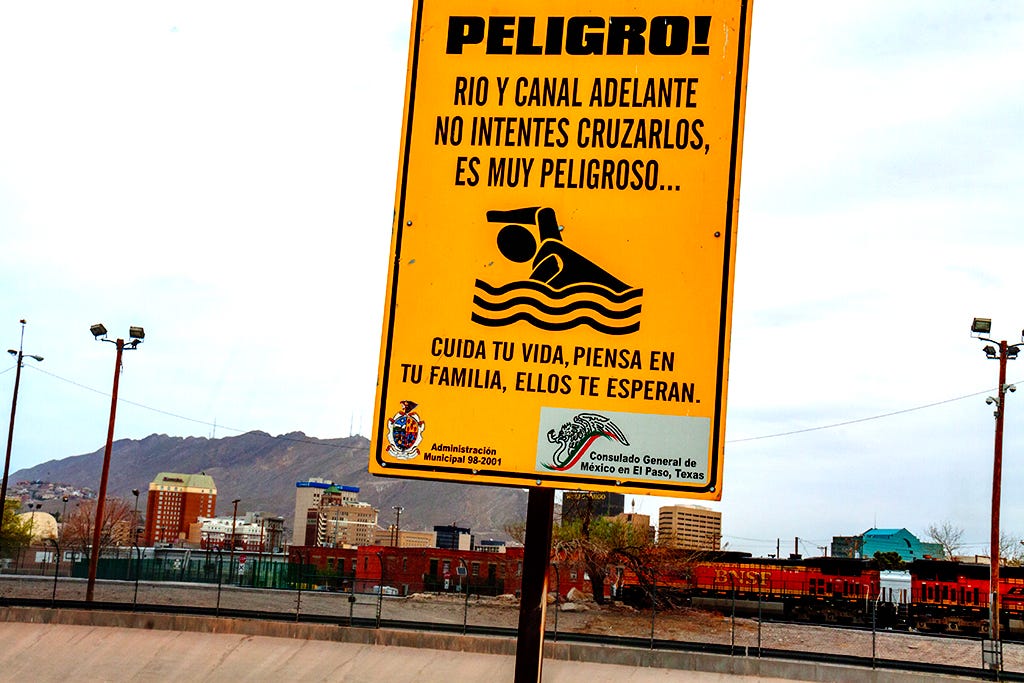[Mexican Festival in Philly’s Italian Market, 9/22/13]
On 9/1/15, as I walked past Wings and More, a skanky Korean-owned bar in Philly’s Italian Market, Jimmy ran out to drag me in. He’s drinking with his Mexican co-workers from Anastasi Seafood.
Not three years later, Jimmy would be fired for stealing, but as the last American employee, his days were numbered anyway. Months after being laid off, Jimmy died. Before moving back to Bucks County, Jimmy said to me and Terrance, “This is your last chance to lend me money.” Just about everyone at Friendly had already given Jimmy money.
At Wings and More, Jimmy introduced me to one guy who had so little English, we couldn’t really talk, but then I met Humberto. When Humberto asked me what I did, I said I was basically a teacher and a writer, then I actually ran nearly two blocks home to get my two books available in Spanish, Otra vez la noche: Cuentos contemporáneos de Vietnam, published in Madrid in 2006, and Todo alrededor de lo que se vacía, published in Mexico City in 2012. Since I had extra copies of Otra vez la noche, I gave Humberto one. “This means a lot to me, my friend,” he said. He was red-eyed and drunk.
Leaving behind a wife and two children in Mexico City, Humberto came to Philly in 1998. By 2000 or so, his wife had found another man, but Humberto’s mother didn't tell him about it until 2002, “When she said, ‘I must tell you something. I have something to tell you,’ I knew something was wrong. Then she told me. She said, ‘Do not drink.’ She knew I would drink to not feel the pain.”
In 2003, Humberto got back to Mexico to try to salvage the situation, but his wife wouldn’t even let him see their children.
“My wife, she was an angel. She still is. She was my everything. I came to the USA to make money to build us a house. Now I can’t even see my children.”
Humberto has found himself a new woman, though. “You're lucky, I said. Many people have nobody.”
“I know, my friend. I can go out, get any woman, but it’s not the same. I can talk about it now. Before, I could not talk about it. In Mexico, when you get married, you make a vow to the Virgen De Guadalupe, and my wife did that. You’re supposed to be together many years.”
“Forever...”
“Yes, forever.”
Humberto is a beefy dude, with moustache, whisker and slicked back hair. On his arms are tattoos of the Virgin of Guadalupe, “Hecho en Mexico,” tragedy and comedy masks, a stylized puma and something I couldn’t quite see. On his neck is “El Rey.” He wore an orange mustle-T showing Japanese cartoon characters. His nickname is “Cornish Hen,” however.
“Why do you let them call you that?”
“I didn’t, but you know how it is. The more you complain, the more they call you that.”
Another guy in Wings and More was called Chinito, “Little Chinese.” He is small and has Oriental features.
“That guy is a good boxer,” one man remarked.
“Him?! You must be joking.”
“He drinks more beer. He good boxer!”
Everyone laughed.
I brought up Chino Maidana, whom Humberto very much admires. Humberto then recounted the knockout punch delivered by Sergio Martinez against Paul Williams. He even showed me how it was done.
“Sergio said, ‘You have to show your opponent some meat.’”
“Meat?”
“Yes, bait. You have to bait him.”
“Then you counterpunch...”
“Yes, like this. Bam!”
It’s one of the best knockouts ever.
I brought up the Chavez/Meldrick Taylor fight, the one that went 15 rounds and was stopped by referee Richard Steele with only two seconds left. Slick, quick and nail tough, Taylor is a Philly guy. He never recovered from that loss.
Humberto, “People think Taylor was winning, but Chavez worked the body. He hurt him. Chavez was winning.”
I disagree. Just two seconds from his greatest triumph, and a victory for the ages, Taylor was robbed, but that’s boxing, and life too. I remember Jeff Fenech putting on a master class against Azumah Nelson, only to see Nelson declared winner. Fenech sobbed inside the ring.
When Vicente Fernández’ “Por tu maldito armor” came on, Humberto sang along with tremendous feeling, “Por tu maldito amor / No puedo terminar con tantas penas...”
Besides me, the only customers were six Mexicans. Jimmy had left. On a wall were photos of patrons and this sign, “NO ESCUPIR EN EL SUELO GRACIAS.” Don’t spit on the floor, thank you. The harsh neons exposed each man’s loneliness.
“Humberto, there are never any women in this bar.”
“I know. They cannot come in because they get attacked.”
He didn't mean that literally, of course. He just meant these lonely drunk guys would pay her way too much attention.
Fights do break out here regularly. Cops have been called.
In 17 years, Humberto could only return home once, “I said to my mother, ‘Don’t die before I can see you again.’”
Thirty-six-years-old, Humberto makes money by delivering pizzas on his bike. His mom is 60-years-old.
Uncle Sam used NAFTA to dump subsidized corn onto Mexico, forcing Mexicans to leave farms to slave in maquiladoras. When these move to Asia, Mexicans had to cross into Alta California, Nuevo Mexico, El Norte or Atzlan. Working for cheap, they keep wages down. Anyone who complains is a racist. Uncle Sam is expert at bankrupting or bombing your house so you must move into his to be his casa nigga. Refugees fleeing wars or wrecked economies benefit top exploiters. Who cares about social chaos on the lowest rungs. Massas need ever cheaper cooks, nannies, whores and factory grunts. Go to Midtown Manhattan and see if you can find any native born American pushing someone else’s baby in a stroller.
Reading about the recent chaos along the US, Mexico border, I’m almost tempted to fly to El Paso. In a rented car, I can drive for hours along the Rio Grande, to see what’s up. My fond memories of that landscape are probably misleading me.
In El Paso in 2012, I met the photographer Julián Cardona. A long-time resident of Juarez, Cardona fully understood how America’s insatiable appetite for drugs and cheap labor wrecked his city. Now is the perfect time to pick Cardona’s brain, but checking online, I found out he died in 2020 at 60-years-old, my age.
The translator of my Todo alrededor is Luis Alberto Arellano. He died at age 40 in 2016, just a year before I decided to look him up in Mexico City.
In Tijuana, I saw border crossers dressed like ninjas. In Juarez, the El Paso skyline seemed so close, the American Dream was just a pole vault away. Strolling into Juarez cost 35 cents! Once I didn’t pay because the Mexican border guard was dozing in his booth. Entering the USA was more complicated. Driving from Ojinaga to Presidio, my rented car was scoured for concealed drugs. That suspicious cop didn’t crack a smile. I’ve written about crossing the illegal footbridge from Candelaria to San Antonio del Bravo. Fierce River of the North my ass. Will Rogers joked that it’s “the only river I know of that is in need of irrigating.”
Outside the famously haunted De Soto Hotel, I ran into a morose old guy in a blue cowboy hat who claimed to be Pancho Villa reincarnated. A loan shark and witch doctor had caused a tumor to grow on his right foot, but Villa paid another witch doctor to get rid of it, so that’s solved. With wet eyes, Villa made the most bizarre statements in a monotone.
Learning I was Vietnamese, Villa asked why all these big countries messed with Vietnam all those years, “Why did China stay for 20 years, Russia for 20 years and the US for 20 years?” As an enlightened revolutionary, Villa would fix everything. Since the US had paid 37 countries to bully then destroy Japan, Villa would move all Japanese to the US, and all Americans to Africa. Vietnamese he would relocate to the USA and Chihuahua.
At El Paso’s The Tap, I met an older black guy who had moved back from happening Juarez. All those pinging bullets and nubile corpses dumped in the desert made just walking around less than relaxing. News of decapitated heads tossed into bars darkened each night out.
Knowing I was prowling around Juarez, poet Clayton Eshleman told me to watch my ass, “Anything can happen to you there.” Eshleman, too, has died.
The biggest question is how will Uncle Sam go out? Will he nuke the chessboard or just soil his pants, then keel over? His death spasm will quake Mexico, as millions of berserkers spill South. With so many Mexicans already there, will Mexican troops march north to reclaim lost land?
Porfirio Diaz famously said, “Poor Mexico, so far from God, so close to the United States.” Soon enough, Mexico will be free of this problem.
Let’s close with a cheerful corrido. Music heals:
Jacinto Treviño This makes 3 times Beauty shows itself; The first was in McAllen, Then Brownsville and San Benito. In Bekar’s cantina A shootout erupted; Shards of broken bottles Flying everywhere. In Bekar’s cantina Only one was left, Only Jacinto Treviño With rifle and pistol. “Come in here, cowardly rangers, You’re not messing with a kid; If you want to know your daddy, That’s me, Jacinto Treviño!” Jacinto Treviño tried to stifle A laugh as he spoke, “To me, Rangers are only suitable To sew my shirt cuffs.” The sheriff then spoke As an American, “Jacinto’s Too much of a man, there’s No denying he’s Mexican.” With this I’ll take my leave From all who are here; If anyone wants to find me, I’ll be waiting in Matamoros. * Jacinto Treviño Ya con ésta van tres veces Que se ha visto lo bonito; La primera fue en McAllen En Brownsville y en San Benito. En la cantina de Bekar Se agarraron a balazos; Por dondequiera volaban Botellas hechas pedazos. Esa la cantina de Bekar Al momento quedó sola; Nomás Jacinto Treviño De carabina y pistola. “Entrele rinches cobardes, El pleito no es con un niño; Querían conocer a su padre, ¡Yo soy Jacinto Treviño!” Decía Jacinto Treviño Que se arrastraba de risa: “A mí los rinches me hicieron Los puños de la camisa.” Decía el sherife mayor Como era un americano: “Ay que Jacinto tan hombre, No niega ser Mexicano.” Ya con ésta me despido Aquí en presencia de todos; Si me quieren conocer Los espero allá en Matamoros.
[El Paso, 4/2/12]
[reincarnation of Pancho Villa in El Paso on 4/2/12]
[El Paso and American train as seen from Juarez on 4/2/12. Sign, “DANGER! RIVER AND CANAL AHEAD / DON'T TRY TO CROSS THEM, / IT IS VERY DANGEROUS... / SAFEGUARD YOUR LIFE, THINK OF / YOUR FAMILY, THEY WAIT FOR YOU.”]
[El Paso skyline as seen from Juarez at border crossing on 4/2/12. Mother and son had just walked to the border for a look.]








I lived in Ensenada for 13 months around 2021. I've never felt so belittled and unwanted in my life. It was worse for me than the Philippines. It wasn't so much that people openly showed hostility to me, rather virtually everyone simply ignored me. No one ever made eye contact. No one said "hola" much less "hola amigo." Granted I'm not a real charismatic person. But I couldn't help but detect an underlying, sort of simmering hostility toward gringos in general and me in particular.
(I can't help but wonder and speculate if some of my fellow Americans preceding me to Mexico perhaps put their arrogant, superior attitude on display thereby leaving many Mexicans wary of the gringos and their bad attitude?)
In addition I almost was hit by cars a couple of times due to drivers who simply weren't looking where they were going. (Much like the Philippines: addled, distracted probably stupid drivers who step on the accelerator first and think second if at all. Often ignoring cross-walk right-of-ways to pedestrians.)
The one time I was foolish enough to walk into a bar in Ensenada the bar maid immediately glared at me before I could even pull up a bar stool. I ordered a beer, drank it quickly, left her a good tip and "vamosed" with alacrity before someone took too much of a disliking to me.
Are Americans hated this much all over the world or did I just happen to pick two unfavorable countries (Mexico and the Philippines) to end up in?
To be fair, the one exception to all this was a guy in Ensenada who was a street vendor on the same block where I rented an apartment. He sold these very good seafood cocktail cups. He would fill a Styrofoam cup with this tomato sauce mixture he had concocted and then add shrimp and raw oysters with a local hot sauce and limes if desired. It was delicious. It was obvious that this guy was 100% native American. Unlike a lot of Mexicans in that part of Mexico he didn't speak a word of English. Come to think of it I'm not sure he spoke Spanish either. I always tried to tip him well. Rents were so low in Ensenada I could afford to be generous to the point of extravagance with tips for the first time in my life and it was a pleasure to do so. Knowing that by giving 20 or 25 pesos I might be providing him (and other hard working servers) with half again his day's wage (or at least a good portion of it.) And this guy was on that street corner with his vending booth from seven a.m. until eight or nine at night, six days a week. By the way, limes and avocados, grown locally, were virtually given away they were so cheap. I recall you could buy four or five avocados for about the equivalent of one U.S. dollar and limes were sold by the bagful for about the same low price. But it was almost impossible to find lemons. Fortunately for me there was an American chain grocery store within walking distance of my apartment, "Smart and Final" was the store's name. Coincidentally, when I Iived in Sacramento (at least before I got priced out of my apartment), the same corporation had a store about the same walking distance from my Sacramento location.
To be perfectly fair, (that is to say not all Mexicans hate all Americans) now that I think about it there was a coffee shop where a bunch of local surfers hung out in back. One afternoon, trying to read, I was struggling with the bright sun streaming in the front window. One of the surfer guys saw what was going on and he very kindly found a sort of camera shade device that he set up for me to provide me with shade. Since I was a regular in that coffee shop the device was kept available for me when ever I dropped in. Very kind of them. The liability or downside of that coffee shop was they not only had no posted business hours; but it was "iffy" what time they would open or even if they would open at all on a particular day. Many days I arrived around nine a.m. only to find them closed and me half fuming impatiently while I paced up and down the boardwalk across the street waiting for them to open.
I departed Ensenda hastily and unexpectedly when I got into a row with my hot-headed property manager. Considering the fact that he had a duplicate key to my apartment I felt it prudent to pack-up and leave without spending another night there. Not wanting to be knifed in my sleep.
All I can say is, "adios, amigos."
Secretary of Agriculture Earl Butz's advice to the American farmer in the 1970's was "get big or get out". As if the American farmer had a choice in the matter.
My maternal grandparents, teenagers during the depression, from very humble Germanic backgrounds were able to acquire and operate a thriving farm between the two of them. The postwar years were good to them and I remember a well tended southern Illinois farm with dairy and beef cattle and hogs in the eighties although I often heard talk of how things were changing.
Some of the happiest days of my life were detasseling seed corn during junior highschool summers. Kids had been walking those rows late July, early August for a couple of generations. Aside from the usual punkery, those times in the early nineties were still idyllic and innocent. Part of me has stayed in those fields and I won't let it go. I remember sitting on the front porch of the house that I grew up in and watching a summer thunderstorm roll across the fields of wheat and soybeans across the yard. It was hypnotic and those thunderstorms are still worth watching. To this day, I make it a point to walk the treelines on the edges of fields. It's a forlorn feeling when I think about the ass fuckery that subsistence farmers worldwide have endured at the hands of American agribusiness. It's criminal and it's appalling.
While I don't relish the idea of a James Howard Kunstler World Made By Hand (a fun series of books) future, if it means the end of Earl Butz's sick warning, I'll consider my options.